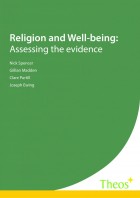Religion and Well-being: Assessing the evidence
A 2016 report from the think tank Theos (www.theosthinktank.co.uk) considers the relationship between 'religion' and 'well-being'. Starting with what can be meant by these terms, the Theos researchers assess the evidence and tease out some of the reasons for it.

Religion and Well-being: Assessing the evidence evaluates the evidence from nearly 140 academic studies conducted over the last three decades examining the relationship between religion and well-being in a wide range of countries and contexts.The report clarifies the key terms, showing how 'religion' has been used to cover a multitude of subtly different concepts, as has 'well-being'. The report not only clarifies the extent to which religion is good for well-being, but begins to explain what this means, adding detail to the big familiar picture.
Ultimately the report confirms that religion is indeed good for well-being, but shows some of the nuances of that relationship. In so doing, Religion and Well-being seeks to inform the debate about how society should capitalise on this important resource.
The following text gives the executive summary of the report. Download and read the whole report if you want to delve deeper into the evidence.
executive summary
This study evaluates the evidence from 139 academic studies conducted over the last 30+ years examining the relationship between religion and well-being. Across the majority of these studies, the data show a positive correlation between religion and well-being. This study not only collates these data but aims to clarify the nature of the relationship between religion and well-being.
It does this by teasing apart the different ways 'religion' and 'well-being' have been understood in the academic literature and surveys. Although the precise categorisations are contestable and different studies sometimes spread over different categories, we identified five conceptions of religion and four of well-being. These are:
- Religion: religious affiliation, subjective religiosity, religious belief, religious group participation, and religious personal participation
- Well-being: subjective well-being, mental health, physical health, and health supporting behaviours
- The definitions of these categories are given in the report, and also in the footnotes to this executive summary.
Having been identified from within the academic studies, these various conceptions of religion and well-being were then used as a framework for analysing the findings.
The data show that the picture is not simply that 'religion' is good for 'well-being' but rather one in which certain aspects of religion are better correlated with certain aspects of well-being.
Social religious participation[1] evidenced the strongest positive correlation across all measures of well-being.
Many of the studies evidenced a straightforward, strong positive correlation between personal religious participation[2] and well-being, most notably mental health.[3]
Religious belief[4] was found to have a largely positive, but more varied, impact on the different measures of well-being.
Subjective religiosity[5] had mixed effects on different indicators of well-being, particularly in the categories of physical health[6] and health supporting behaviours.[7]
The loosest category of our indicators of religion, religious affiliation,[8] was shown to have the weakest effect on well-being.
Of the measures of well-being, subjective well-being[9] seems to be the most sensitive to the effects of the different types of religiosity.
Higher levels of involvement in religion are more beneficial to mental health overall.
Within the category of physical health the phenomenon of religious coping[10] is quite evident.
At the most generalised level, it seems that the more serious, genuinely held and practically-evidenced a religious commitment is, then the greater the positive impact it is likely to have on well-being.
© 2016 Theos
references – executive summary
[1] 'Social religious participation' pertains to the active (and regular) participation in group religious worship services, although some studies include other forms of religious social participation, such as volunteering.
[2] 'Religious personal participation' pertains to engaging in acts of private devotion such as prayer, scripture reading, or listening to religious music.
[3] 'Mental health' pertains to measures of depression, anxiety and the like, and has a more clinical focus than subjective well-being.
[4] 'Religious belief' pertains to personal belief in God or a higher power, and assent to tenets or doctrines of a religious group, for example, belief in an afterlife.
[5] 'Subjective religiosity' pertains to the degree of influence that beliefs have on a person's decisions and lifestyle and the sense of having a personally meaningful relationship with God or a higher power.
[6] 'Physical health' pertains to indicators including chronic pain, recovery rate from illness, and mortality rate and like mental health is a more clinical category than subjective well-being.
[7] 'Health supporting behaviours' pertains to those activities that tend to have a positive effect on physical health, such as by preventing substance abuse or addiction, or by encouraging exercise or healthy eating.
[8] 'Religious affiliation' pertains to the extent to which an individual identifies with religion. Although this can range from a cultural affinity to full community participation, this is nonetheless is a 'low threshold' category, i.e. it need not demand significant commitment on behalf of the respondent.
[9] 'Subjective well-being' pertains to measures of self-reported happiness, including life satisfaction, personal evaluation of progress towards life goals, and having a sense of meaning in life.
[10] 'Religious coping' pertains to the habit of religiosity (in different guises) being used as a way of offsetting the effects of poor health, and consequently promoting a better sense of wellbeing.
Authors of the report:
Nick Spencer is Research Director at Theos.
Gillian Madden is a former research intern at Theos. She is currently completing a MA in Christian Leadership (St Mellitus College), and read Politics and International Relations at Macquarie University (Sydney).
Clare Purtill is a former research intern at Theos. She read Theology and Religion at Durham University and has an MA in Christian Theology (Catholic Studies).
Joseph Ewing is a former research intern at Theos. He read Philosophy, Politics and Economics at Oxford University.
© 2016 Theos



